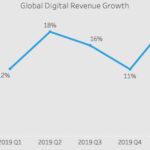Why this pandemic may change the fabric of society in many ways

We are living in unprecedented times — cities, regions and countries across the globe are locked-down in an attempt to flatten the curve and contain the spread of the coronavirus. Quite suddenly, the vast majority of us — unless we rank as key workers in medicine, food supply or in other core utility or public service roles — have had to get used to working from home. Aside from the web-connectivity challenge that this presents for some people, it also gives us a new set of challenges in terms of how we work.
For many office workers, the set of tasks they are involved in can be encapsulated in a workflow of methods and responsibilities that everybody almost instinctively understands, possibly due to our human proximity. But now we have taken that proximity factor away, so how are we going to connect, collaborate and cooperate effectively in the weeks ahead?
There are many questions to be asked here. Will working from home become the new accepted norm? When this situation is over and we can all officially return to the office, will those roles and functions that were previously thought of as requiring an office presence be changed forever? Can the time spent by employees now be more definitively and productively split between the office and home?
Will the way we work be changed forever by COVID-19?
When working remotely, it goes without saying that technology becomes the heart of every interaction. But online videoconferencing anxieties aside, we are all going to have to make sure that we understand the value of communication a lot better.
For some, this whole shift is going to be massive. We may find that older school managers have become so dependent on the structure of physical office meetings that the leap is almost too much. We know that some people feel that they have to be in the room with other people in order to get things done. They don’t have the soft skills needed to express themselves effectively over video and voice calls.
Younger workers among the millennials and open-minded Generation X workers will have more of these skills, but for Generation Z this kind of thing comes instinctively. Born in and of the web-cloud era, Gen-Z is happy with a webcam pointed at them and will naturally feel less of a shift here.
Although I am painting a largely positive picture here for individuals, let us remember that employees are just one of the three corporate elements in the central work equation. Employers can find positives from remote work too, but equally they may find that tracking some specific tasks and managing performance become harder.
Thirdly — and always crucially — we have the customer. Aspects of goods and services provision will differ by industry, and some will change for the better, while some may be less positive, it is still too early to say at this stage.
Very often it may be the core family issues that people find most challenging. If you have kids, then the next few weeks will require you to navigate some uncharted waters. How do you manage to ensure they keep up with their distance learning assignments, how do you keep them entertained, what rooms can they go into, when is it appropriate for them to interrupt you if you are busy working? We will no doubt see countless memes and parodies of hilarious and unfortunate situations.
On the flipside, maybe now the kids, and significant others, will start to understand what it is we do all day when going to work. Our family is now seeing aspects of work life that they will not get to experience until they themselves are in the thick of it.
There is a positive to be gained here. As our families get exposed to our work methods and hear us on telephone calls and web-based video platforms, we gain a new and fresh feedback loop that may have never previously existed.
When your partner says, Gosh, do you really talk to people like that? you may stand back and assess the way you empathise with difficult work issues. Equally of course, your partner may say, Really? You let them get away with doing that? It works both ways, obviously.
Taking stock of the thought process presented here then — which I would like to suggest has been cathartic in and of itself — we can perhaps look to one very significant change that COVID-19 might drive. With so many people stopping their daily commute, could the impact upon climate change and pollution be a downstream change that we are able to harness for lasting positive impact?
If we can be working effectively in the situation that has been handed to us, we may even be able to drive some positive self-reflection benefits out of the predicament. If we can increase the time spent on activities that fuel our creative thought, then perhaps we can help create world solutions to ensure that this dreadful pandemic is the last of its kind.
Key takeaways
- Will working from home become the new accepted norm?
- Will those roles and functions that were previously thought of as requiring an office presence be changed forever?
- Can the time spent by employees be more productively split between the office and home?
- When working remotely, technology becomes heart of every interaction.
- We are all going to make sure that we understand the value of communication a lot better.
- Employers can find positives from remote work, equally they may find tracking tasks and performance became harder.
By Chris Pope, VP Innovation, ServiceNow.





